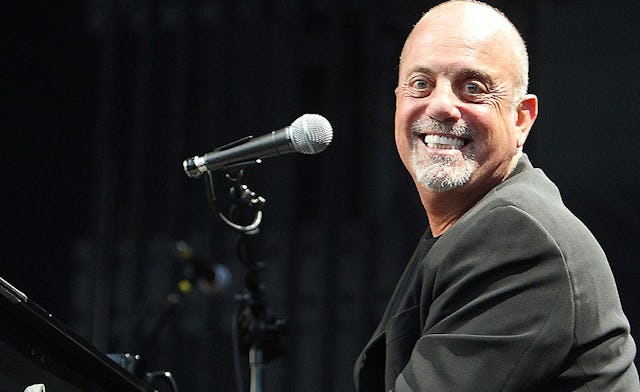The Revelations About Aging You Experience at a Billy Joel Concert

I thought the concert at Boston’s Fenway Park last summer would be an unadulterated joyful experience. Seeing Billy Joel live was something I’d dreamed of for decades, something I’d put on my bucket list after successfully finishing treatment for breast cancer in the spring of 2014.
I would see Billy in concert, damn it! And it would be awesome.
So what went wrong?
The concert was great, sure, but it stirred up something too. We’ve all likely experienced how music can induce time travel, and Billy’s voice that warm summer evening tripped me back to that Pepto-pink bedroom of my youth and my mother’s voice (she’s now been dead nearly 13 years) singing off key to “Just the Way You Are,” to an entire era and family life long gone.
Yet it was Billy’s appearance that struck me the most, particularly when the video panels flanking the stage flashed images of Mr. Joel’s younger self. The difference between that guy and the dude on the stage was startling. Here, again, was the young man with the wavy dark mane and saucer-shaped eyes that I remembered well from the album covers of my childhood. That was my Billy Joel, not that bald man with the gray goatee sitting at the piano. Trying to tie the two together did not compute. I kept thinking, “When did Billy get so old?” Which of course meant, “When did I get so old?”
I grew up in New York in the ’70s and ’80s. Billy’s voice was the soundtrack of my youth. At ten I knew all the words to “Scenes From an Italian Restaurant,” a feat I was quite proud of, as well as just about every other song on every album. In my teens, after my older sister Nili left for college, I’d lie on her bed and listen to the song “Vienna” from The Stranger over and over on her record player. What exactly was I pining for as Billy sang, “slow down, you crazy child, take the phone off the hook and disappear for a while” just for me?
But I didn’t want to slow down. I wanted to find “Vienna”—wherever and whatever that actually meant, something better, I assumed. I wanted to grow up fast.
Seems I got my wish.
Aging is akin to traveling at a great speed for a long stretch and then—triggered by a song or a smell or a place—you’re faced with a sudden STOP. A sudden slamming on the brakes that demands you take notice: YOU ARE HERE. Today I am a 46-year-old mother of two. And while I’m happy to be alive, I’m getting jarred by these sudden STOPS more frequently now. I’m increasingly aware of the expanse of time behind me.
How time passes is an enigma. When I push at it and attempt to come up with something wise to share on the topic, my mind moves toward clichés and song lyrics:
In the blink of an eye. Time flies. Time keeps on slipping into the future. Time is on my side.(Perhaps Mick is right—he doesn’t look so bad and is still performing at 71.)
What’s easier to explore is the feeling conjured in these moments, an emotional ache that at first I couldn’t name. Then the word came: nostalgia. In more recent years I have felt nostalgic not just at Billy Joel concerts but elsewhere, like driving down Commonwealth Avenue on the campus of my alma mater, Boston University. I live near Boston and have driven down that street hundreds—maybe thousands—of times over the last two decades, my only reaction being curiosity at what had changed. On this last drive by, however, the change that mattered was not the stores or buildings but me, and the distance, not in miles but in years, between the college student I was then and the motherless mom and cancer survivor I am now. It happened again recently, while having lunch with a friend at a restaurant I used to work at in my mid-twenties. This feeling came, like a tiny seismic shift in the universe, after talking to an attractive young server and attempting to accept that this boy was not my peer, but young enough be my son.
I find the origins and evolution of the word nostalgia fascinating. Originally coined by a German scholar named Johannes Hofer, the term was a rendering of the German hemiweh—or home + woe. It’s also associated with the Greek nostos—“return home” + algos—“pain.” For hundreds of years, it served mainly as a military medical diagnosis, and was cited as a cause of death for military officers. Only as recently as 1920 did the meaning of the word change to embody the more modern notion we have of nostalgia, that of a “wistful yearning for the past.”
Perhaps it’s the surprise of nostalgia that makes it difficult to deal with when it sneaks up on you, like at the Billy Joel concert. Because when I choose to embrace things from my past, the feeling is often the opposite. Like teaching my kids my favorite songs by Run-D.M.C., or watching with them a couple of favorite shows from my childhood, Scooby Doo and The Brady Bunch. It’s the same when I share a scene from the The Jerk or Valley Girl with a friend on Facebook. I feel connected again with these historical relics, not homesick.
Sure, I would love to go home again to that Pepto-pink room. And see my mother again. But beyond that, I am not longing to go back to those complicated, insecure days of my youth. At 46, I’m more secure in who I am, and what I want, and with what fills me, than ever before.
Perhaps this is Billy’s “Vienna,” then. Right here.
This article was originally published on